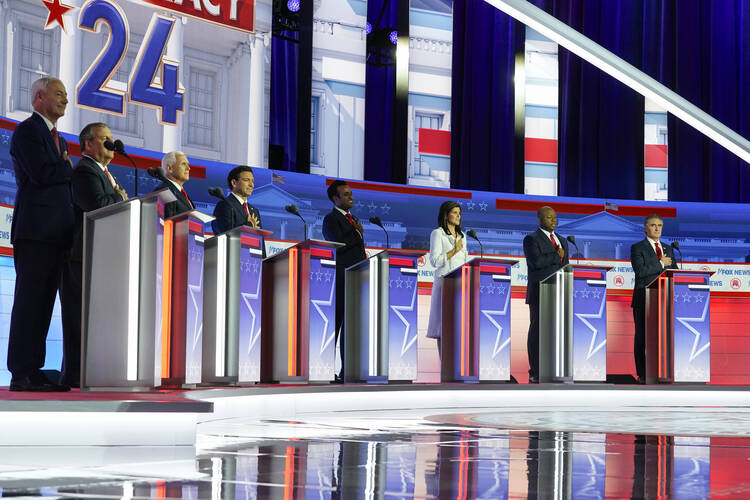After the U.S. Supreme Court’s June 2022 decision in Dobbs v. Jackson Women’s Health Organization struck down the high court’s nearly 50-year-old abortion precedent since Roe v. Wade, the group SBA Pro-Life America said it would seek for Republican presidential candidates to specifically back a federal 15-week gestational limit on abortion.
In 2020, 93% of abortions in the United States took place by 13 weeks, according to data from the Centers for Disease Control and Prevention — meaning the federal limit sought by SBA would ban some abortions but leave most legal.
Of the GOP candidates who participated in the Aug. 23 debate, only former Vice President Mike Pence, South Carolina Sen. Tim Scott and former Arkansas Gov. Asa Hutchinson said they would support a federal 15-week limit. Those candidates argued the high court sent the issue of abortion back to legislatures, whether state or federal.
Just three of the top nine Republican candidates have said they would sign a federal abortion limit sought by a prominent pro-life group.
Florida Gov. Ron DeSantis, former U.N. Ambassador Nikki Haley, North Dakota Gov. Doug Burgum, former New Jersey Gov. Chris Christie and entrepreneur Vivek Ramaswamy have not specifically backed such a ban.
At the debate, Haley argued that while she is pro-life, the Senate’s filibuster procedure will effectively block efforts by either political party to enact federal abortion legislation without increased consensus on the issue. That rule requires the votes of 60 senators to pass most legislation in the upper chamber before it can be sent to the president’s desk.
“When you’re talking about a federal ban, be honest with the American people,” she said.
In her previous role as South Carolina governor, Haley did sign a 20-week abortion limit in that state, although post-Dobbs the state reduced that to six weeks, a law its state Supreme Court held up the same day as the debate.
DeSantis touted a six-week ban he signed in Florida, a measure that is not currently in effect amid a legal challenge; but he dodged a question about whether he would do so at the federal level.
Trump has not committed to a specific, or even any, federal limit on abortion post-Dobbs, except to say that he would “look at” a 15-week abortion ban if it passed Congress and explore options.
“Look, I understand Wisconsin is going to do it different than Texas,” DeSantis said. “I understand Iowa and New Hampshire are going to do it different, but I will support the cause of life as governor and as president.”
Burgum cited the Constitution’s 10th Amendment, arguing that individual states determining their own limits is constitutional, and the issue should thus be “returned back to the states.”
Trump has not committed to a specific, or even any, federal limit on abortion post-Dobbs, except to say that he would “look at” a 15-week abortion ban if it passed Congress and explore options.
In an Aug. 23 statement, Marjorie Dannenfelser, president of SBA Pro-Life America said the debate “made it clear who is and is not prepared to be a National Defender of Life.”
“Some were bold in sharing the plight of the unborn in half the country where brutal late-term abortions continue at any point in pregnancy for any reason,” Dannenfelser said. “They understand that where you live should never determine whether you live.”
Dannenfelser singled out Burgum, criticizing his argument that “life is solely a matter for the states” as “unacceptable for a nation founded on unalienable rights and for a presidential contender.”
Praising Pence, Scott and Hutchinson, Dannenfelser said those candidates “each offered a clear, bold case for national protections for the unborn at least by 15 weeks, when they can feel pain, which aligns with the overwhelming consensus of Americans.”
An AP-NORC poll in July found that while nearly three quarters of Americans said abortion should be legal in the first six weeks of pregnancy, that number dropped to 51% at 15 weeks.
“Additionally, those who offered the clearest contrast pointed out the Democrats’ agenda of imposing abortion on demand until birth in every state, nationwide,” she said. “Going on offense is essential for any candidate who wants to win in 2024.”
The group appears to be keeping its powder dry on endorsing a candidate in the race, with Dannenfelser telling reporters on a press call prior to the debate that SBA may or may not make an endorsement in the primary.
An AP-NORC poll in July found that while nearly three quarters of Americans said abortion should be legal in the first six weeks of pregnancy, that number dropped to 51% at 15 weeks.
Marist polling conducted before and after Dobbs shows a majority of Americans support keeping abortion legal through the first trimester, during which nine out of 10 abortions take place.
Haley argued at the debate that Democrats should instead be asked about their abortion limit, “Are they for 38 weeks? Are they for 39? Are they for 40 weeks?”
Former White House press secretary and current MSNBC host Jen Psaki wrote on X, formerly known as Twitter, “No one supports abortion up until birth.”
The DeSantis campaign responded with a five-minute video of clips of Democratic politicians saying they do not support abortion limits.








